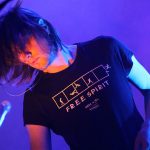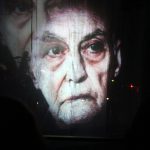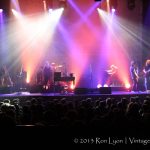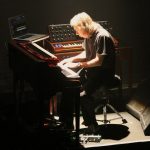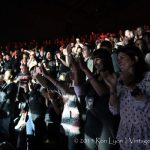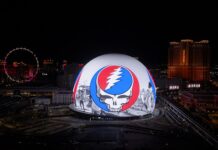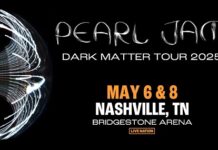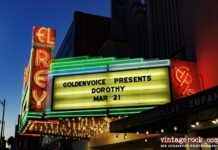Review by Shawn Perry
Photos by Ron Lyon
You have to respect someone like Steven Wilson. He took the concept of Porcupine Tree and molded it into a formidable progressive rock band. He’s boldly dabbled in numerous one-offs and collaborations, mostly outside his comfort zone (if such a thing exists). And, with an ear for mixing the masters, he’s reshaped the music of King Crimson, Jethro Tull and Emerson, Lake & Palmer into surround sound ear candy.
With Wilson’s career in full bloom and a magnificent third solo disc called The Raven That Refused To Sing (And Other Stories) making waves, I wasn’t sure what to expect when he and his five-piece band stepped onto the Club Nokia stage in Los Angeles for the final show of their North American tour. After two mind-blowing hours, any expectations I didn’t have were completely off the map and pleasantly disrupted.
What can I say? You get in the habit of seeing the same acts year in and year out, and then you decide to change it up, and see something new and unusual and kapow! — It gives you hope that true-to-the-heart, inspiring music is still being conceived, written and performed by superb musicians. That, in a nutshell, is how it went seeing Steven Wilson.
The dark stage lit up as the musicians took their places shortly after 9:00. For tonight’s performance, Wilson’s band included one-time Miles Davis sideman Adam Holzman behind the keyboards, Guthrie Govan on lead guitar, Nick Beggs on bass guitar and backing vocals, Theo Travis playing the woodwinds, and guest drummer Chad Wackerman, whose swift stick work has made its way onto recordings by Frank Zappa and Allan Holdsworth.

Beggs lead the way through the fiery bass-centric intro of “Luminol” as Wilson, bare-footed in a T-shirt and jeans, his low-hanging gold PRS swinging to and fro, paced back and forth in an anxious state. The 12-minute track began to unfold and you could tell each player knew his respective role as everything fell prodigiously into place.
Most of the night focused on The Raven That Refused To Sing (And Other Stories), a collection of six songs festering with literary, phantasmagorical themes and imagery. “Drive Home” expanded and contracted in ethereal glow with Wilson strumming an acoustic. “The Holy Drinker,” about drinking with the devil, had the audience marveling at Govan, Holzman and Travis, who built a cacophonic wall of sound, only to give way to the vocals.
Wilson, who engaged in light banter between numbers and even toyed with an audience member who yelled out “Freebird,” also pulled out quite a few plumes from Grace From Drowning, his previous solo album from 2011. He explained how “Postcard” was supposed to be a “single,” but said its dark lyrics didn’t quite meet up with established pop standards. The impending drama behind “Raider II,” its stark opening bringing the theater to a deafening silence, doesn’t exactly support Wilson’s half-hearted dalliances with the Top 40, but it proffered a gripping intensity rarely witnessed on a concert stage in this day and age.
Another element subtly introduced into the program was the captivating visuals. There was the standard projection of still images and video on suspended displays. Then a large, transparent curtain came down for “The Watchmaker.” An image of the lined face of an old man, presumably the watchmaker himself, superimposed itself over the band as they played through the song’s elegant verses. Halfway through, a fertile imagination and a fondness for nostalgia might lead you to believe that is what it would be like if Genesis were still performing with Peter Gabriel. Or maybe the Beach Boys on a foggy night.
Encoring with “Radioactive Toy,” from Porcupine Tree’s debut album On The Sunday Of Life, was a rather appropriate prelude, tracing the musical genius of Steven Wilson back to its roots and providing a rich foundation for everything that’s come since. As the concert wound down, a sense of seamless joy and enlightenment filled the room. For this reviewer, it was a journey through an unexplored segment of sound, begging to be sanctified. Call it a road less traveled in need of further investigation.





